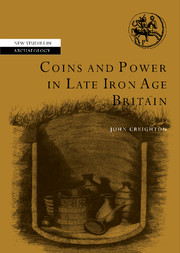Book contents
- Frontmatter
- Contents
- List of figures
- List of tables
- Preface
- Acknowledgements
- List of abbreviations
- Note on translations used
- Introduction
- 1 The Middle to Late Iron Age transition
- 2 Coin and the representation of individual authority
- 3 The Southern and Eastern kingdoms
- 4 Classical imagery and ideology in Britain
- 5 The location of Britain in the Roman world
- 6 Legends and language
- 7 Dynasties and identities
- 8 Conclusion and epilogue: from Britain to Britannia
- Appendix: A brief introduction to Iron Age coinage in Britain
- References
- Index of coin types
- General index
- NEW STUDIES IN ARCHAEOLOGY
Introduction
Published online by Cambridge University Press: 22 September 2009
- Frontmatter
- Contents
- List of figures
- List of tables
- Preface
- Acknowledgements
- List of abbreviations
- Note on translations used
- Introduction
- 1 The Middle to Late Iron Age transition
- 2 Coin and the representation of individual authority
- 3 The Southern and Eastern kingdoms
- 4 Classical imagery and ideology in Britain
- 5 The location of Britain in the Roman world
- 6 Legends and language
- 7 Dynasties and identities
- 8 Conclusion and epilogue: from Britain to Britannia
- Appendix: A brief introduction to Iron Age coinage in Britain
- References
- Index of coin types
- General index
- NEW STUDIES IN ARCHAEOLOGY
Summary
The first century BC was a time of great upheaval in the Roman world; individuals freed themselves from the bonds of the Republic and fought openly for power. Marius, Sulla, Pompey, Caesar: all in their own way had the blood of the Republic on their hands. Finally, after generations of sporadic civil war, a new consensus began to emerge among the poor and the senatorial class alike; a consensus which could support the rule of one individual, so long as the pill was not made too hard to swallow. Thus Caesar's heir rose to become Augustus, the first Roman emperor, and the Principate began. Oligarchy gave way to autocracy.
At the same time a transformation was taking place in Britain. Over the first century BC and the early first century AD individuals rose to prominence here, too. Certain groups buried their dead using new rituals which left lasting monuments to their memory; some were interred with an opulence hitherto unseen in Britain. Meanwhile the living adopted new architectural values, giving up traditional circular norms and residing in rectangular structures instead. Alongside this, new political centres emerged, generally referred to as oppida. Finally, the anonymity of prehistory gave way to the arrival of the individual, made present not only by cremated bones in the ground, but also by names on coins and references in the annals of Rome. History begins.
- Type
- Chapter
- Information
- Coins and Power in Late Iron Age Britain , pp. 1 - 3Publisher: Cambridge University PressPrint publication year: 2000



